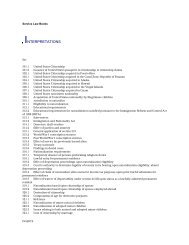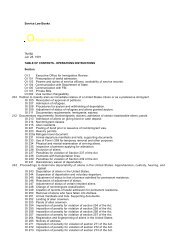Create successful ePaper yourself
Turn your PDF publications into a flip-book with our unique Google optimized e-Paper software.
<strong>Inspector's</strong> <strong>Field</strong> <strong>Manual</strong><br />
interrogations of suspects, taking sworn testimony often in a foreign language, and developing, evaluating, and<br />
independently making determinations for immediate or deferred action as each situation indicates. Working<br />
under severe time constraints, determines factual elements from incomplete or conflicting data, determines<br />
factual elements from seemingly disparate facts which often lead to sophisticated domestic and/or<br />
international conspiracies or other unforseen results.<br />
In judgment situations, determine how far to go in sensitive or difficult situation, determine how<br />
important particular actions are and whether they are reasonable. Provides ways to facilitate processing while<br />
ensuring enforcement and inspectional requirements are met. Work performed at this level requires the<br />
incumbent to develop, evaluate, and control information from all levels of the socio-economic structure and<br />
requires broad flexibility and independence in making decisions concerning such things as interpreting a large<br />
volume of conflicting information, planning of the work, or refining the methods and specialized techniques to<br />
be used.<br />
5. Scope and effect<br />
The purpose of the position is to enforce the Immigration and Nationality Act and related statutes, i.e., 8<br />
U.S.C. 1154; 8 U.S.C. 1158; 8 U.S.C. 1182-1184, 8 U.S.C. 1187; 8 U.S.C. 1222; 8 U.S.C. 1225-1227; 8 U.S.C. 1281; 8<br />
U.S.C. 1282; 8 U.S.C. 1286; 8 U.S.C. 1287; 8 U.S.C. 1301; 8 U.S.C. 1321-1325; 8 U.S.C. 1327; 8 U.S.C. 1357; 8 U.S.C.<br />
1361; 8 U.S.C. 1401-1409; 8 U.S.C. 1431; and 8 U.S.C. 1432. Through the investigation and analysis of unusual<br />
conditions, problems, and questions, inspectors prevent unauthorized persons from entering the United States;<br />
deter the smuggling of aliens, promote crime detection and prevention within their assigned area; and effect the<br />
apprehension, prosecution, and expulsion of excludable aliens.<br />
Many of these excludable aliens are also violators of criminal statutes. Through the application of<br />
appropriate investigative techniques, the incumbent may provide the inspector with information concerning<br />
organized crime or international terrorist organizations. Effective performance of duties has considerable<br />
impact on reserving employment opportunities for United States citizens and legal resident aliens, and on the<br />
operation of other law enforcement agencies.<br />
The immigration inspector is not only charged with the responsibility for enforcing the administration<br />
of criminal laws of the United States, but is also responsible for providing immigration information to the<br />
general public, attorneys, Federal, state, and local law enforcement agencies, and foreign government officials,<br />
as well as the intelligence community. When performing adjudicative functions, the inspector must possess a<br />
wide and varied range of knowledge which is required when reviewing and making final determinations to<br />
grant or deny an applicant benefits sought under the Immigration and Nationality Act.<br />
6. Personal contacts<br />
Contacts are made independently with employees at various levels in Headquarters, regions, districts,<br />
sectors, and ports-of-entry; employees of other Federal, state, and local government agencies; diplomats, foreign<br />
government officials, members of Congress, and other United States Government officials; and<br />
proprietors/officials of aircraft, vessels, and other related concerns.<br />
Has contact with people asking admission into the United States, who frequently include inadmissible<br />
aliens, i.e., those with criminal backgrounds, smugglers, terrorists, and drug traffickers. Other contacts include<br />
attorneys, bond company officials, law enforcement officials, private citizens, confidential informants, and<br />
members of the media.<br />
7. Purpose of contacts<br />
Contacts are established for the purpose of determining admissibility to the Untied States,<br />
providing/exchanging information, intelligence gathering, as well as for liaison and training with other state,<br />
national and international law enforcement agencies. In addition, contacts are made for the purpose of<br />
establishing an applicant's eligibility for benefits under the Immigration and Nationality Act.<br />
Contacts are to elicit information in stressful or hostile situations; unearth irregular practices where<br />
efforts have been made to hide them; identify operational problems, work out solutions, negotiate important<br />
questions of compliance, enforcement, and smuggling practices with high level INS officials and other




